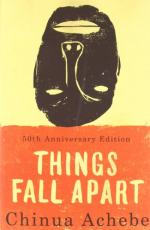|
|
Things Fall Apart Author/Context
Chinua Achebe was born on November 16, 1930 in Ogidi, Nigeria. The son of missionary teachers Isaiah Okafo and Janet Achebe, the writer was raised as a Christian. Achebe was educated at the Church Mission Society and then Government College in Umuahia before he attended Ibadan University where he received his BA in English literary studies in 1953. His first novel, Things Fall Apart, was published in 1958.
In an essay written in 1972, Charles R. Larson says, "Things Fall Apart has come to be regarded as more than simply a classic; it is now seen as the archetypal African novel. The situation which the novel itself describes - the coming of the white man and the initial disintegration of traditional African society as a consequence of that--is typical of the breakdown all African societies have experienced at one time or another as a result of their exposure to the West.
Achebe married in 1961 and is the father of four children. He came to the United States in the early 1970s as a visiting professor at the University of Massachusetts in Amherst and then the University of Connecticut, as well as lecturing at the University of California, Los Angeles and other schools across the nation. In 1976 he returned to Nigeria to teach at the University of Nigeria-Nsukka.
Achebe is credited with building the foundation for African literature. His writing style molds the English language to the rhythm and lyrical quality of the Nigerian language his characters speak. This style, and the incorporation of the proverbs and idioms of African culture, combine to mark his stories as uniquely African.
Achebe sees his role as a writer as one of social responsibility. In his book of essays, Morning yet on Creation Day, Achebe explains his belief that "art is, and always was, at the service of man. Our ancestors created their myths and legends and told their stories for a human purpose." Therefore, Achebe believes that all good stories should have a purpose and that is what he has tried to emulate in his works.
In addition to Things Fall Apart, Achebe has also written several other novels - No Longer at Ease (1960), Arrow of God (1964), A Man of the People (1966), and Anthills of the Savannah (1988). He has also published several books of poetry including Beware, Soul-Brother, and other Poems (1972) and Christmas in Biafra, and Other Poems (1973). His collections of essays are Morning Yet on Creation Day (1975), The Trouble with Nigeria (1984), and Hopes and Impediments (1988).
Bibliography
"Achebe, Chinua." Black Literature Criticism. Vol. 1. Ed. James P. Draper. Detroit: Gale Research, Inc., 1992.
"Achebe, Chinua." Contemporary Authors: New Revision Series. Vol. 47. Detroit: Gale Research, Inc., 1995.
"Achebe, Chinua." Dictionary of Literary Biography: Twentieth-Century Carribean and Black African Writers. Vol. 117. Bernth Lindfors and Reinhard Sander, ed. Detroit: Gale Research, Inc. 1992.
Achebe, Chinua. Things Fall Apart. New York: Alfred A. Knopf, Inc., 1958.
Larson, Charles R. Chinua Achebe's Things Fall Apart: The Archetypal African Novel. Indiana University Press, 1972.




